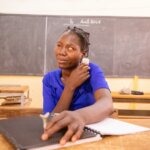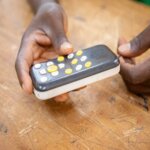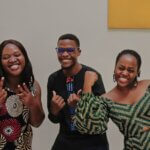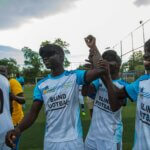- General
- Inclusive Education
Technology-assisted learning is increasingly common, and not only since the COVID-19 pandemic kept us working and studying from home. For learners with disabilities, accessible technology and digital devices can make all the difference, opening up new ways of participation.
Children with disabilities face huge disadvantages and barriers in their access to education: from harmful stereotypes and lack of financial resources to inaccessible schools and learning materials.
One in ten children worldwide – about 240 million – has a disability, according to UNICEF’s latest report. So, whenever we talk about necessary transformation in the education sector, disability inclusion and accessibility must surely be part of the conversation.
Inclusive education in practice
Light for the World works with its government partners, NGOs, and funding partners to ensure learners with disabilities have access to inclusive education. Our inclusive education projects offer practical evidence of how learners with and without disabilities can study together. They also showcase inclusive and accessible learning environments and technologies.
The power of technology
Technology is playing an increasingly important role in our programmes as well as in the overall education sector. The UNESCO Global Education Monitoring Report 2020 mentions accessible technology as a key tool for inclusive learning.
Assistive devices can help students follow the teacher’s instructions, enable reading and writing and strengthen school performance and self-confidence overall.
A success story from Burkina Faso
In Burkina Faso, we work in alliance with Organisations of People with Disabilities such as UN-ABPAM, the Education Ministry and the education movement to achieve an ambitious, yet essential goal: transforming the education system towards equal education opportunities for learners with disabilities.
As part of these efforts, we equipped schools and students with audio recording devices (such as the EVO10 audio player) and other assistive technology. Books and study materials are being made accessible through Braille print and e-publications.

Nadège from Koupéla lost her sight at the age of three. In 2020, she successfully completed her final exams despite lengthy school closures, using an accessible audio player. Now she wants to become a journalist.
With a little help from technology
When the schools in Burkina Faso had to close due to COVID-19, the accessible digital solutions already introduced were vital to the blind and partially sighted students, enabling them to continue their studies from home.
Philippe Compaoré, in charge of our education programme in Burkina Faso, explains: “Technology plays a crucial role in providing access to pedagogical and didactical materials, especially for blind and partially sighted learners.”
Challenges in education
The use of technology and other efforts to transform education into a more inclusive system are well underway in many regions. However, we are far from achieving SDG 4 by 2030. Millions of learners are still denied their right to education. Funding for inclusive education shows an alarming downwards trend. Teachers need extensive training in disability inclusion, while parents need better information about their children with disabilities’ right to go to school.
We need more financial resources to provide accessible technology for students with disabilities. Indeed, this is the path to really make education inclusive and fit for the future!
Philippe Compaoré, Light for the World Burkina Faso
Conclusion
While we celebrate the International Day of Education, we mustn’t forget the end goal: comprehensive transformation of education. This means education systems which welcome learners in all their diversity, offer equitable opportunities to all, are fully accessible, and which recognise and foster everyone’s potential.





